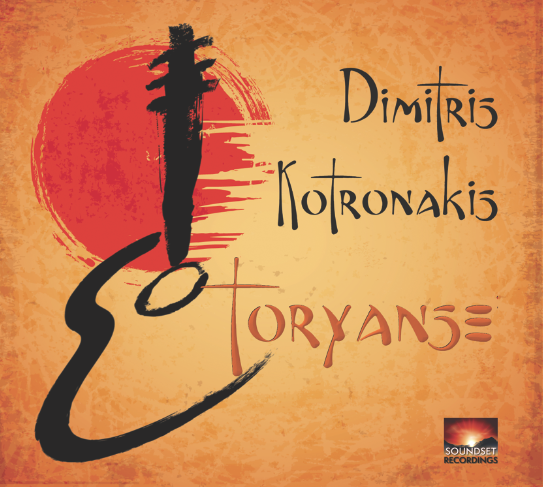 |
|
Toryanse
Dimitris Kotronakis
Soundset Recordings
Exciting repertoire and playing from Greek guitarist. It is always intriguing to hear someone new playing fresh material, and all the better if, from the first notes of the recording, you feel you are in for a real treat. Dimitris Kotronakis (b. 1973) is a lauded guitarist, with a diploma and doctorate to his name, and also the muscular surety of a great technique and the ability to make the guitar sing. There is an eclectic array of composers here: Atanas Ourkouzounov; Carlo Domeniconi; Thanassis Moraitis; Gerard Drozd; Štepán Rak, Astor Piazzolla, and Sergio Assad; over an hour’s worth of distinct and vivacious music that is both gratifying and uplifting. I haven’t heard Rak’s works in a new release for a long time, and the Russian overtones of Kaygorod and Balalaika, as you might expect, are great tremolo ventures for Kotronakis. Bulgarian composer Ourkouzounov uses Japanese idioms to create a dynamic tapestry with the titular Toryanse Tales. Expect surprises with the Domeniconi pieces, especially the gorgeous A Step to Paradise. Two sketches by Moraitis give a nod to Kotronoakis’ Greek heritage, and Drozd’s Adagio, Op. 44 is an “air”-style homage to J.S. Bach. The guitarist avoids Piazzolla pitfalls by aiming further afield than most do, highlighting his Suite Troileana (transcribed by Dario Bisso), with the movements “Bandoneon” and “Zita” well-executed and leading delightfully to Sergio Assad’s superb Fantasia Carioca.Toryanse is an excellent recording, bursting with exciting repertoire that should help to maintain a buoyant interest in the guitar.
- Tim Panting, Classical Guitar Magazine (Summer 2017)
Greek guitarist Kotronakis’ latest is an an excellent and very diverse collection of pieces by a fine international cast of modern composers - Atanas Orkouzounov (Bulgaria, though his title track is filled with Japanese inflections), Stĕpán Rak (Czech Republic; his two pieces are Russian-influenced); Carlo Domeniconi (Italy), Thanassis Moraitis (Greece), Gerard Drozd (Poland); Sérgio Assad (Brazil); and the ubiquitous Astor Piazzolla (Argentina). Every piece Kotronakis has chosen goes someplace interesting, and he is equally comfortable with balladic presentations such as Drozd’s beautiful Bach-influenced Adagio, Op. 44 or Domeniconi’s A Step to Paradise, the Piazzolla tango Zita, or demanding multi-textured works like Toryanse Tales and Assad’s epic Fantasia Carioca. Outstanding all the way around!
Toryanse Tales (Ourkousounov); Kaygorod (Rak), Balalika (Rak); A Step to Paradise (Domeniconi); Toccata in Blue (Domeniconi); Sketch No. 9 (Moraitis); Sketch No. 1 (Moraitis); Adagio, Op. 44 (Drozd); Suite Troileana: Bandoneón, Zita (Piazzolla); Fantasia Carioca (S. Assad)
- Classical Guitar Magazine (February 8, 2017)
Fascinating performance! This is a collection of works that is exotic even by the standards of the international guitar. It opens with Atanas Ourkouzounov’s ‘Toryanse Tales’, based on a Japanese legend that involves the first seven years of a child’s life, and a children’s song that is often played at street crossings. The composer manages to evoke Japan without cliches, and several interesting effects are demanded. Kontronakis is fully up to the challenges. Stepan Rak is Czech, but his works here evoke Russia - 'Kaygorod' is a morose waltz with an appropriately Russian sounding melody, and Balalaika is a 9-minute tour de force that demands, among other things, a rapid tremolo with the last finger of the right hand - the one finger guitarists don’t normally use. Again, Kontronakis plays with admirable conviction and control, with electrifying
results. Both the Domeniconi works have considerable jazz influence - a slow, intense ballad, and a virtuosic toccata. Greek composer Thanassis Moraitis wrote his Sketches for Kontronakis in 2010, and both evoke traditional Greek music, dances for the bouzouki. And not everything is so exotic - Polish composer Gerard Drozd evokes Bach in his moving ‘Adagio. Nearly everything by Astor Piazzolla is a transcription - he played his own music for his ensemble, and the instrumentation varied. This transcription of Suite Troileana is from his tribute to his longtime musical partner, bandoneonist Anibal Troilo. The recital ends with Serio Assad’s virtuosic ‘Fantasia Carioca’, his tribute to the citizens of Rio de Janeiro. This piece is occurring more and more often in guitar recitals, most recently in Pavel Kukhta’s recital (N/D 2016). That was a fine performance, but Kontronakis is every bit as fine. I’ve often reflected that, after a wildly turbulent first 70 years of the last century, nothing new has emerged since about 1970 - minimalism was the latest new-ism to arise. At that point, after the extremes of Darmstadt and aleatory, anything was possible. Composers since then have taken an eclectic approach, using whatever fit their particular vision from the infinity of possibilities. One thing that has not been fully explored is some sort of synthesis with the other classical traditions of the planet. This recording, and Matthew Fish’s release of the works of Johannes Moeller, reviewed in this issue, might be the start of that new direction. Whether that is true or not, this is a stimulating and thoroughly enjoyable release.
- American Record Guide, January/February 2017 (KEATON)
Dimitris Kotronakis
Soundset Recordings
Exciting repertoire and playing from Greek guitarist. It is always intriguing to hear someone new playing fresh material, and all the better if, from the first notes of the recording, you feel you are in for a real treat. Dimitris Kotronakis (b. 1973) is a lauded guitarist, with a diploma and doctorate to his name, and also the muscular surety of a great technique and the ability to make the guitar sing. There is an eclectic array of composers here: Atanas Ourkouzounov; Carlo Domeniconi; Thanassis Moraitis; Gerard Drozd; Štepán Rak, Astor Piazzolla, and Sergio Assad; over an hour’s worth of distinct and vivacious music that is both gratifying and uplifting. I haven’t heard Rak’s works in a new release for a long time, and the Russian overtones of Kaygorod and Balalaika, as you might expect, are great tremolo ventures for Kotronakis. Bulgarian composer Ourkouzounov uses Japanese idioms to create a dynamic tapestry with the titular Toryanse Tales. Expect surprises with the Domeniconi pieces, especially the gorgeous A Step to Paradise. Two sketches by Moraitis give a nod to Kotronoakis’ Greek heritage, and Drozd’s Adagio, Op. 44 is an “air”-style homage to J.S. Bach. The guitarist avoids Piazzolla pitfalls by aiming further afield than most do, highlighting his Suite Troileana (transcribed by Dario Bisso), with the movements “Bandoneon” and “Zita” well-executed and leading delightfully to Sergio Assad’s superb Fantasia Carioca.Toryanse is an excellent recording, bursting with exciting repertoire that should help to maintain a buoyant interest in the guitar.
- Tim Panting, Classical Guitar Magazine (Summer 2017)
Greek guitarist Kotronakis’ latest is an an excellent and very diverse collection of pieces by a fine international cast of modern composers - Atanas Orkouzounov (Bulgaria, though his title track is filled with Japanese inflections), Stĕpán Rak (Czech Republic; his two pieces are Russian-influenced); Carlo Domeniconi (Italy), Thanassis Moraitis (Greece), Gerard Drozd (Poland); Sérgio Assad (Brazil); and the ubiquitous Astor Piazzolla (Argentina). Every piece Kotronakis has chosen goes someplace interesting, and he is equally comfortable with balladic presentations such as Drozd’s beautiful Bach-influenced Adagio, Op. 44 or Domeniconi’s A Step to Paradise, the Piazzolla tango Zita, or demanding multi-textured works like Toryanse Tales and Assad’s epic Fantasia Carioca. Outstanding all the way around!
Toryanse Tales (Ourkousounov); Kaygorod (Rak), Balalika (Rak); A Step to Paradise (Domeniconi); Toccata in Blue (Domeniconi); Sketch No. 9 (Moraitis); Sketch No. 1 (Moraitis); Adagio, Op. 44 (Drozd); Suite Troileana: Bandoneón, Zita (Piazzolla); Fantasia Carioca (S. Assad)
- Classical Guitar Magazine (February 8, 2017)
Fascinating performance! This is a collection of works that is exotic even by the standards of the international guitar. It opens with Atanas Ourkouzounov’s ‘Toryanse Tales’, based on a Japanese legend that involves the first seven years of a child’s life, and a children’s song that is often played at street crossings. The composer manages to evoke Japan without cliches, and several interesting effects are demanded. Kontronakis is fully up to the challenges. Stepan Rak is Czech, but his works here evoke Russia - 'Kaygorod' is a morose waltz with an appropriately Russian sounding melody, and Balalaika is a 9-minute tour de force that demands, among other things, a rapid tremolo with the last finger of the right hand - the one finger guitarists don’t normally use. Again, Kontronakis plays with admirable conviction and control, with electrifying
results. Both the Domeniconi works have considerable jazz influence - a slow, intense ballad, and a virtuosic toccata. Greek composer Thanassis Moraitis wrote his Sketches for Kontronakis in 2010, and both evoke traditional Greek music, dances for the bouzouki. And not everything is so exotic - Polish composer Gerard Drozd evokes Bach in his moving ‘Adagio. Nearly everything by Astor Piazzolla is a transcription - he played his own music for his ensemble, and the instrumentation varied. This transcription of Suite Troileana is from his tribute to his longtime musical partner, bandoneonist Anibal Troilo. The recital ends with Serio Assad’s virtuosic ‘Fantasia Carioca’, his tribute to the citizens of Rio de Janeiro. This piece is occurring more and more often in guitar recitals, most recently in Pavel Kukhta’s recital (N/D 2016). That was a fine performance, but Kontronakis is every bit as fine. I’ve often reflected that, after a wildly turbulent first 70 years of the last century, nothing new has emerged since about 1970 - minimalism was the latest new-ism to arise. At that point, after the extremes of Darmstadt and aleatory, anything was possible. Composers since then have taken an eclectic approach, using whatever fit their particular vision from the infinity of possibilities. One thing that has not been fully explored is some sort of synthesis with the other classical traditions of the planet. This recording, and Matthew Fish’s release of the works of Johannes Moeller, reviewed in this issue, might be the start of that new direction. Whether that is true or not, this is a stimulating and thoroughly enjoyable release.
- American Record Guide, January/February 2017 (KEATON)



